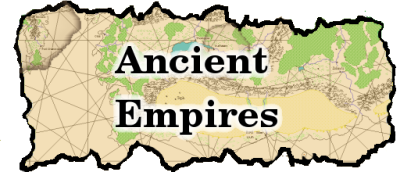Turns
A turn will consist of the players developing strategic plans for their nations, role-playing diplomacy and personal actions, and learning the results of their strategic plans.Length
Each turn represents about 3 years of game time.
Strategic Plans
At the beginning of each turn the players will announce their "plans" to the group. This will be done in the style of the Classical Matrix Game, where the players have the freedom to make up any sort of event they can imagine. In a very real sense, the players are making up the rules to the game as they go along (only those rules are just as likely to change in the next turn).
For example:
Plans may include an attack on a neighboring kingdom, your spies discovering the secret formula for creating healing potions, a revolt of peasants that disrupts your opponents ability to collect taxes, or anything else that might possibly help your nation succeeded in the game.
Once the plans have been announced, the GM will rate each one on how likely it would be for them to occur. It is the GM's responsibility to make sure that the players' actions (which are very free), keep with the spirit of the game and are fair to the other players. Plans that are likely to succeed are ones that are logical, that build on events that have already occurred, fit into the game world, and use the resources that the characters have available. The plans are rated according to the scale in table 1 below. The scale shows a FUDGE level that indicates the skill roll that must be made against the appropriate skill for that plan to succeed. A FUDGE skill level of Mediocre is considered the "Base Skill" in the third and fourth columns.
Table 1: Plan Ratings
| Plan Rating | FUDGE Skill Roll Needed | Roll Needed for Base Skill to Succeed |
Percent Chance of Success with Base Skill |
| Very Strong | Poor | -1 | 84% |
| Strong | Mediocre | 0 | 62% |
| Average | Fair | +1 | 38% |
| Weak | Good | +2 | 18% |
| Very Weak | Great | +3 | 6% |
| Stupid | Superb | +4 | 1% |
For Example:
A player who has a Shui nation may plan that their farmers have discovered new agricultural techniques and their harvests double and triple, which increases the nations resources and in turn increases the power of the nation.
Since this is a logical plan that fits with the races background the GM may rule that the chance of the plan succeeding is Strong (62% chance)
Another Example:
A character with a starting FUDGE skill of Mediocre would need to roll +1 to succeed at an average plan (see table above). On the other hand, when the skill level reached Good then Average plans would succeed on a roll of -1 or better.
If the GM determines that two plans conflict then the rolls will be done slightly different. One of the two conflicting plans must succeed so rolls will be made until one is successful and the other fails. As long as both succeed or both fail, re-rolls will be made.
In some cases, the GM may determine that the events involved in a players plans should be role-played out. In that case a roll will not be made, but the outcome of the role-playing will determine the success of the plan. This role-playing is in addition to any role-playing that the players do outside of developing their plans.
Nations' Power:
The relative power of a nation is made up of it's size and strength, which in turn are broken down further.
Size – calculated as the average of Population and Resources
Population – The number of people in the nation.
Resources – the amount of natural resources, stockpiles, etc., readily available.
Strength – calculated as the average of Technology and Morale
Technology Level – Includes both normal technology and magical knowledge.
Morale – how willing the population, and especially the army, is to support the leadership in times of trouble.
